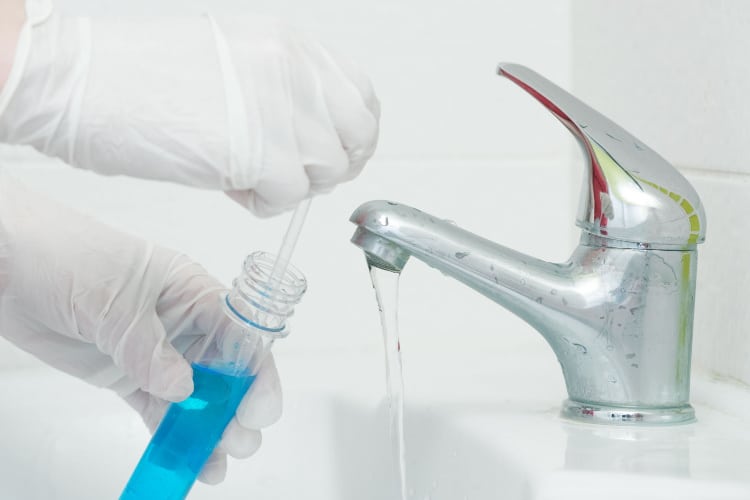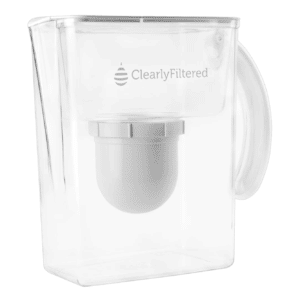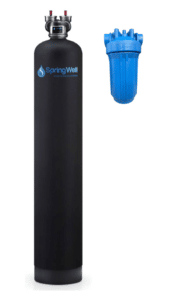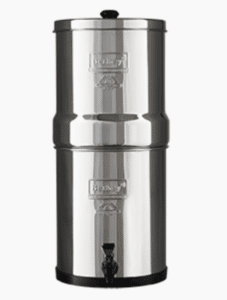Like fluoride, chlorine is a chemical that municipal water authorities all across the States and in many other countries add into the water supply to eliminate bacteria and other pathogens that may leak and contaminate the water source
This type of chlorination doesn’t always cause excessive levels of chlorine in water, which is anything above 4 mg/L according to the standards set by the Environmental Protection Agency. However, since chlorine is a chemical, it causes changes in the taste, color, and smell of the water, none of which are pleasant.
So, many American households prefer to remove chlorine from their water, and Brita filters, regardless of their filtration technology, can remove or reduce chlorine levels by 92% – 95%. That said, Brita isn’t the only option when it comes to eliminating chlorine from your drinking supply, as there are better alternatives on the market.
In this article, we’re going to explain how Brita filters remove chlorine and provide you with a list of Brita alternatives that can do a a similar or better job than Brita.

How Does Brita Remove Chlorine?
Brita water filter pitchers, dispensers and faucet filters use activated carbon filtration technology to significantly reduce 92% – 95% of chlorine in water.
In addition, all Brita filters hold an NSF/ANSI 42 certification, which confirms that a water treatment unit can treat water for contaminants that are regulated under the National Secondary Drinking Water Regulations (NSDWRs) set by the EPA. NSDWRs mainly pertain to aesthetic impurities such as taste, odor, and color.
To confirm that a water treatment device is capable of producing water that’s compatible with NSDWRs and thus eligible for the NSF/ANSI 42 certification, an independent laboratory tests the claims of the manufacturers of water treatment units. In the end, if the product meets the manufacturer’s claims, its filtration capacities are clearly laid out in a performance data sheet.
Brita provides performance data sheets for all the filters in its catalog, with the removal/reduction rates of chlorine listed clearly. In addition to chlorine, Brita filter removes lead and other contaminants.
Alternatives to Brita for Removing Chlorine From Water
Establishing Brita’s effectiveness in removing chlorine doesn’t actually mean that the discussion ends here. There are many alternatives to Brita filters that can reduce chlorine equally effectively but are superior to Brita in some ways. Some perform better when it comes to removing more dangerous contaminants like lead, and are more durable or affordable.
Water Pitcher Brita Alternative: Clearly Filtered Water Pitcher
With a minimum chlorine reduction rate of 99.5%, The Clearly Filtered Water Pitcher is an upgrade on Brita products, as their respective rate is only 92%. But not only that – thanks to its special filtration technology that’s referred to as Affinity Filtration, it can also remove a staggering 365+ other contaminants.
The unique physical structure of the Clearly Filtered filter allows for more surface and contact time with water, making it possible for the pitcher to remove more contaminants than its competition. The filter also features a contaminant magnet that attracts and binds the dangerous ions of contaminants such as lead and arsenic.
What’s even better about the Clearly Filtered is that it has all the relevant certifications from the National Sanitation Foundation: NSF Standards 42, 53, 244, 401, and 473, respectively confirming that the product can remove aesthetic impurities, health hazards, microbiological contaminants, emerging compounds, and the microcystins produced by blue algae. The specific contaminants it can remove or reduce and its success rate are well-documented in the performance data sheet.
Depending on the contaminant levels in your water and your water use, the Clearly Filtered filter needs to be replaced once every 4 to 6 months. However, considering that the replacement filter costs $49.50, it is more expensive than Brita, whose replacement filters cost between $7 and $20.
But given the performance you’ll get from the Clearly Filtered, that’s only a small price to pay for the purest drinking water you can possibly get from a water pitcher.
Whole House Filtration Alternative to Brita: SpringWell Whole House Water Filter System
SpringWell is one of our preferred water treatment brands, and its whole-house filtration system is a testament to why that’s the case. In addition to chlorine, its 4-stage ActivFlo filtration technology removes hazardous chemicals like herbicides, pesticides, and PFAS and provide healthy water for the family.
Here’s how its filtration process works:
- Flex media bed: It allows for more contact time with water, thus eliminating contaminant runoffs.
- Kinetic degradation fluxion filter: This filter employs a medium made of copper and zinc alloy and excels in removing chlorine, chloramines, pathogens like bacteria, microbes, and viruses, and heavy metals like lead and arsenic.
- Catalytic carbon bed: As we established before, activated carbon can remove chlorine from water. Catalytic carbon is an upgrade on that as it can also remove or significantly reduce hydrogen sulfide.
- 5-micron sediment filtration: Lastly, a sediment filter prevents sediment like rust and clay from ending up in your faucets.
Unlike Brita products that can only treat drinking water at the point-of-use, the SpringWell Whole House Water Filter system supplies clean water to all the faucets in the house, so you’ll have better quality water for laundry, dishwashing, bathing, and other household needs.
However, as you can expect, a whole house filtration system is much more expensive than a simple water pitcher or dispenser, and that’s also the case with SpringWell’s whole house filtration system
Lastly, unlike Brita products, the SpringWell Whole House Water Filter System doesn’t have any NSF certifications, but user experience can attest to its efficiency.
Countertop Filtration System Alternative to Brita: Big Berkey Water Filter
Countertop filtration doesn’t get any better than with the Big Berkey Water Filter, and, in our experience, no Brita filter can even get into a contest with it. In addition to chlorine, it can remove 202 other contaminants from the 2.25 gallons of water stored in its tank within only a couple of hours.
This countertop filtration system owes its impressive performance to its innovative filtration tech, also referred to as the Big Berkey Elements. Employing three different filtration processes (microfiltration, absorption, and adsorption) just in one filter cartridge and allowing for extended contact time with water, the Big Berkey also eliminates pathogens like viruses, heavy metals like lead, and chemicals like chlorine super effectively.
Although it’s not an NSF-certified system, the Big Berkey was tested by an EPA-certified independent laboratory, and its performance has been documented in a data sheet.
Brita Alternatives Comparison Chart
| Brita Alternatives | Contaminants removed | Filtration technology | Filter Type | NSF certifications | Price |
|---|---|---|---|---|---|
| Clearly Filtered Water Pitcher | 365+ contaminants including lead, arsenic, and chlorine | Affinity Filtration | Water pitcher | NSF/ANSI Standards 42, 53, 244, 401, and 473 | $90.00 |
| SpringWell Whole House Water Filter System | An unspecified number of contaminants including chlorine, hydrogen sulfide, and bacteria | 4-stage ActivFlo filtration | Whole house filtration system | Not certified | $981.79 |
| Big Berkey Countertop Water Filter | 203 contaminants including lead, viruses, and chlorine | Big Berkey Elements | Countertop filter | Not certified, but independently tested by an EPA-certified lab | $367.00 |
Conclusion
Activated carbon filtration method is an effective way of removing chlorine from water, and since all Brita filters employ this method, they’re all capable of removing chlorine from water.
However, activated carbon is far from the only method to remove chlorine, as there are many similar or better alternatives to Brita that do not only remove chlorine but also eliminates many other more contaminants.


